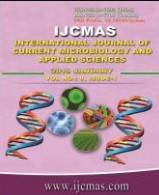


 National Academy of Agricultural Sciences (NAAS)
National Academy of Agricultural Sciences (NAAS)

|
PRINT ISSN : 2319-7692
Online ISSN : 2319-7706 Issues : 12 per year Publisher : Excellent Publishers Email : editorijcmas@gmail.com / submit@ijcmas.com Editor-in-chief: Dr.M.Prakash Index Copernicus ICV 2018: 95.39 NAAS RATING 2020: 5.38 |
On farm trials in ten locations were conducted to evaluate efficacy of IDM practices with emphasis on use of bio-control gents for management of rhizome rot in turmeric and to create awareness among the farming community on rhizome rot management during Kharif, 2014-15 to 2016-17 in the farmer’s fields in Krishna District of Andhra Pradesh. By adoption of IDM practices with emphasis on use of Trichoderma viride as seed treatment and soil application, neem cake and other cultural practices to remove excess water from the root zone in all the three years, the rhizome rot incidence was reduced on an average by 2.06 per cent compared to 5.53 per cent in farmers practice. The average dry rhizome yield in the treated plots was 77.5q/ha compared to 69.27q/ha with an increase of 11.87 per cent. This has resulted in reduction in the average cost of cultivation by Rs. 34100.00 per hectare and the average net income was improved by Rs. 86997.00 per hectare compared to the farmers practice. The average benefit cost ratio also improved to 2.06 compared to farmers practice of 1.58 and giving a clear message that adoption of IDM practices with emphasis on use of bio-control agents and neem cake helped in reducing the disease incidence levels, damage and improved yield; helped in improving the net income levels to the resource poor farmers.
 |
 |
 |
 |
 |